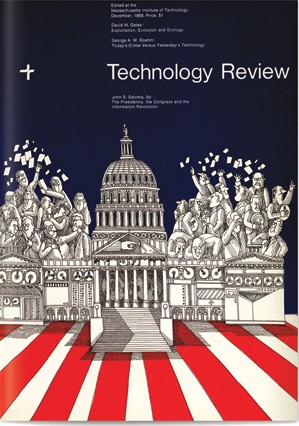Can IT Cure Congress?
Computer-based analysis as it is refined over the remaining decades of this century will make possible an advance in human intellectual capacity comparable to the invention of language, Arabic numerals, and calculus. With his new ability to understand the dynamics of complex organizations and social processes, the congressman of tomorrow will explore a range of problems previously beyond the grasp of his predecessors.

Studies by RAND Corporation experts suggest that by the early 1970s computers will be small, powerful, plentiful, and inexpensive. Computing power will be available to anyone who needs it, or wants it, or can use it either by means of a personal console connected to some large central facility, or by a small personal machine … By the mid-1980s, the computer will begin to realize its potential as a research tool through modeling and experimentation, as an integral part of the educational system, and in areas such as medicine and biological sciences …
One can readily foresee a congressman sitting at a console in his office poring over computer print-outs into the late evening hours or over the weekend and cutting through the paper arguments and justifications of executive programs with penetrating lines of questions. The possibility of abuse also exists, but the weight of past congressional experience suggests that most congressmen will use such new investigative power wisely. In situations that invite adversary argument, alternative positions and points of view will be more thoroughly developed and cogently presented.
The analytical concepts and techniques associated with the new information technology—systems analysis, program budgeting—are not particularly new. What is new is the capacity of automatic data processing to make ‘operational’ the concept of an organization as a total system. The revolution in information technology represents an almost immeasurable potential increase in man’s knowledge—especially in his understanding of and ability to control his environment. The intelligent use of that knowledge and the power it confers is an awesome responsibility. In a political democracy it involves the democratic consideration of emerging technological possibility and consequence. The multiple perspectives of the American system, the numerous points of access for developing, testing, and advancing ideas may ultimately prove to be among the greatest assets of American democracy in the future.”
Excerpted from “System Politics: The Presidency and Congress in the Future,” by John S. Saloma, associate professor of political science at MIT, in the December 1968 issue of Technology Review.
Keep Reading
Most Popular
Large language models can do jaw-dropping things. But nobody knows exactly why.
And that's a problem. Figuring it out is one of the biggest scientific puzzles of our time and a crucial step towards controlling more powerful future models.
How scientists traced a mysterious covid case back to six toilets
When wastewater surveillance turns into a hunt for a single infected individual, the ethics get tricky.
The problem with plug-in hybrids? Their drivers.
Plug-in hybrids are often sold as a transition to EVs, but new data from Europe shows we’re still underestimating the emissions they produce.
Google DeepMind’s new generative model makes Super Mario–like games from scratch
Genie learns how to control games by watching hours and hours of video. It could help train next-gen robots too.
Stay connected
Get the latest updates from
MIT Technology Review
Discover special offers, top stories, upcoming events, and more.